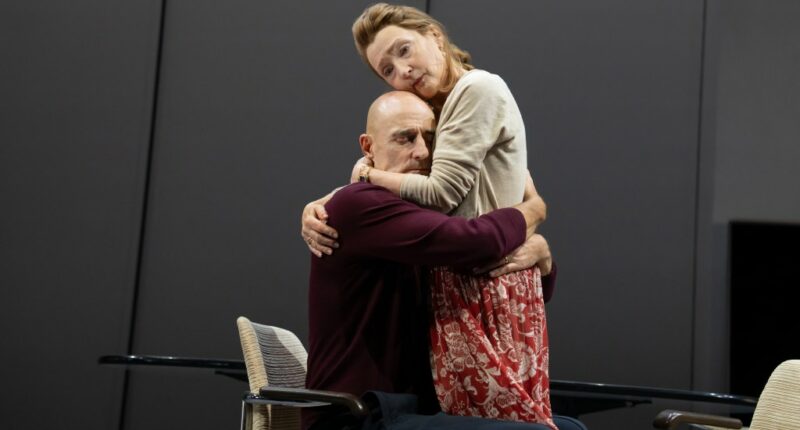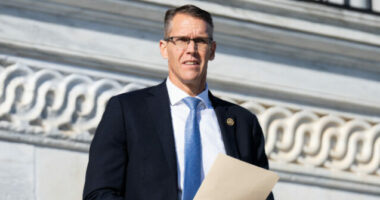Share this @internewscast.com
A countdown clock ticks away at the campaign headquarters of Oedipus, a political hopeful aiming to unify a fractured city-state that has lost its ability to communicate effectively. Could this setting be closer to our reality than we think?
As exit polls promise a favorable outcome, Oedipus’ team—which includes his wife Jocasta, daughter Antigone, sons, drivers, and campaign aides—gears up for a celebration. However, an unexpected twist emerges. Oedipus becomes consumed with uncovering the secrets of his past and is determined to reveal them during his anticipated victory speech, despite warnings from those more knowledgeable to halt his quest before it leads to disaster.
The campaign merchandise boldly declares, “Truth is a motherf—er,” capturing the essence of the unfolding drama.
This intriguing setup is the foundation of Robert Icke’s latest adaptation of Sophocles’ classic “Oedipus the King.” The play, which debuted at Broadway’s Studio 54 on Thursday following a successful run in London’s West End, reimagines the tragic King of Thebes as a charismatic and overconfident politician. The production, which earned numerous accolades in the U.K., features Mark Strong in the lead role. If one were to draw a parallel between Strong’s portrayal and a contemporary figure, Gavin Newsom might come to mind.

That is, of course, if Newsom had committed patricide and married his mother.
In this production, Jocasta—both wife and mother—is portrayed by Oscar nominee Lesley Manville.
Spoiler alerts don’t really apply in Greek tragedy. The original audience in 5th-century B.C. Athens all knew the plot in advance and the source play is a veritable orgy of dramatic irony, meaning the audience’s pleasure comes from consistently knowing more than the characters do about themselves and their eventual fates.
Aristotle called “Oedipus the King” the perfect tragedy and that still applies in my book, two and a half millennia later. Sophocles was the original thriller writer, and this ancient masterpiece is one of tense concision as this terrible choice inexorably and painfully leads to that bad outcome. And we all fall asunder as the all-knowing gods telegraph the way to our fate.

Icke’s work is really something: I can’t recall ever previously being as riveted at a Greek tragedy. And my admiration for his show is increased by how Icke manages to stay remarkably true to so much of the original play while turning its dialogue into contemporary speech. This doesn’t read as something based on the Greek original — it feels like the play itself, reenergized with the kind of crackling relevance all too rare on Broadway. With Shakespeare, theater artists pretty much have to stick to the original text. But since Greek tragedies were not written in English, everything has always been an adaptation, thus freeing creativity. Spectacularly so, here.
I’ve a few caveats. The show’s coda, which I will keep quiet here, doesn’t fully land. Although potent and word-perfect, Strong’s take strikes me as needing a touch more likeability. If Ickes really wanted to evoke the essential paradox of the Sophoclean original, I think he’d pay more attention to what this candidate has to do for this broken country. Classical scholars will point out that Oedipus has no choice but to seek out that which destroys him. Here, it feels like he does.

Still, few will care. I’ve always thought one of the most interesting questions in “Oedipus” to be “what does Jocasta know and when does she know it?” Manville, in a blistering and deeply complicated performance, certainly keeps one guessing, until the truth overwhelms her and the audience.
The stellar British actors Samuel Brewer, Bhasker Patel, Jordan Scowen and James Wilbraham have come over with the show. Among the U.S. newcomers, the formidable Teagle F. Bougere appears in a small but pivotal role, one that helps unlock the mystery. The spectacularly good Bougere totally creeped me out.
Moreover, nobody at my performance moved much of a muscle for the two intermission-free hours. Safer, it felt, to stay put in your seat.

















